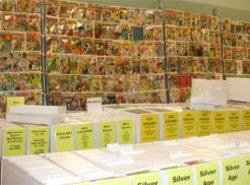Videos by ComicBook.com
For retailer Guy Joyner, part of the experience of coming to shows like these was to help build up his customer base, saying, “You need to be out here to see customers over and over to establish a relationship. That’s what keeps this all going.” In an increasingly virtual world, would customers still want and even need those relationships as online comics are on the rise from both major and independent publishers?
Retailer Allison Humphrey, new to comics as a whole herself, felt that digital comics, “Would be great! The more you can get things out there, especially digitally, would make people more interested in this. Comics are a good hobby.” Fellow new reader Drew Edelson was quick to point out his feelings about digital comics, “I don’t do them. I tried Daredevil online, and it was good to read, but it’s more important for me to hold and have them than read them on a computer.”
The tactile aspect of comic books was something Michael Wright strongly agreed with, “I’m not interested in digital comics. Without the book there’s no comics at all. That’s the reason these guys {retailers} are here with these gems from the 50’s and 60’s. If it goes digital, it kills all that.”
While some harbored those staunch feelings, others saw the digital and web comics movement as a step in the evolution of the genre. “I still like having something in my hand,” offered Samantha Drogo, “but it’s great as a new outlet for people to be able to get material when they can’t get the physical books. I think as long as people are reading comics then it’s fine.” Damien Grosser of Greensboro, North Carolina seemed to feel that print and web comics could peacefully coexist, “I read a lot of web comics like Penny Arcade and Questionable Content. I know there’s a lot of discussion on the rights of artists and the needs of print comics, but I read a lot of trade paperbacks too. I think the web comics are a good way to keep up with something that’s more serial. I don’t think web comics can do big story arcs as well as print comics though.”
Many small press and independent publishers have begun to see the internet as a way to promote their books, even if it is for free initially, in the hopes that it will lead to an increase in sales of their printed products and books, especially if their printed books are only displayed in their local comic book shops. Rich Stahnke, writer and artist of Furious Fist of the Drunken Monkey and the upcoming When Drive-Ins Attack, felt that web comics can help increase visibility for books such as his, “Diamond’s new policies on distribution make it harder for smaller publishers to get recognition. Online comics have proven that they are a feasible business plan, and several publishers have made it work.” Stahnke also cited recent technologies as a way to increase distribution, “You have the rise of the iphone, itunes, and all sorts of applications that are making it possible for companies to make comics that can be downloaded. I don’t think print comics will ever go away, but there have to be lots of options for people to distribute and promote their work.”
The world of digital comics and web comics is still largely uncharted territory, but readers will have to begin making interesting choices regarding online and downloadable content over the next few years, as devices such as Kindle and the ipod become more and more commonplace and used for more than just music and traditional books. Will companies such as Marvel and DC begin scaling back on their print runs of mainstream titles in order to drive up interest in digitally downloaded comics? Maybe not in the short-term, but with companies seeking ways to cut back on costs, digital comics may become a logical outgrowth of budget constraints. For smaller publishers, this could become an area in which they gain ground, both in visibility and market share. No matter what, feelings on both sides of the issue, for now, remain divided.









